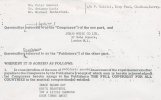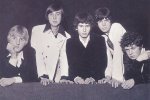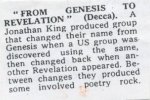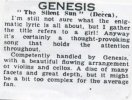“The Story of… From Genesis To Revelation” Narrated
by Alan Hewitt.
Well, it seems somewhat appropriate as the band celebrate their 41st anniversary
and the album itself reaches that magical 40th anniversary, that TWR explore
the album and its place in the Genesis story.
It seems ridiculous now to think that Genesis were at one time, almost unknown
and operating mainly to public and critical indifference but that was very much
the situation as the fledgling group of young Carthusians began to create their
own unique kind of music. The band had their beginnings in two school bands
at Charterhouse: Anon and The Garden Wall . However, the real genesis of the
band occurred in the summer of 1967 when, thanks to the encouragement of Jonathan
King, they were signed initially to a five year publishing deal with his company
Jonjo Music. This was reduced to a one-year contract when the parents objected
(the band members were still legally minors at the time).
King’s reputation has certainly taken a pounding
recently but at the time, he was very much the flavour of the month having
already provided a hit for Hedgehoppers Anonymous in the shape of Everyone’s
Gone To The Moon. The two Charterhouse bands eventually merged due to
the lack of a drummer for an Anon gig at the school, an event which Anthony
Phillips vividly recalls…
“There is this story when the group got together, the gathering
of the members when we had to find a drum kit for Rob Tyrrell to play,
and there was this guy in my house who was a nice guy, but quiet and fastidious,
almost slightly old womanish… and when I tell you his name of course…
it was understandable a couple of younger guys …tearaways wanting
to borrow his drum kit . I didn’t really know what he could do but
he came along and said nothing and just sat through the entire rehearsal
and of course, it was Peter Gabriel! The early thing was terribly speculative
… Peter coming along literally singing this song to accompany Tony
Banks on the keyboards and that was the song that got thrust into Jonathan
King’s hands and then we signed this publishing contract and got
ten quid each…” |
 The band’s first publishing contract courtesy of Anthony
Phillips
The band’s first publishing contract courtesy of Anthony
Phillips |
Anon had already written and recorded a good many songs one of which, originally
titled Patricia was destined to become In Hiding on the album. The primitive
recording “studio” of fellow Carthusian Brian Roberts was to see
the recording of the first Genesis recordings in the summer of 1967 as Ant recalls…
“He might also have what was the first Genesis tapes which was the session
where Mike and I went to record our songs and since then I had got to know this
guy (Peter) who could sing a bit. I got Tony Banks to come and play some keyboards
on it and he was going to bring Peter, his vocalist, who I hadn’t really
heard sing; to do one song. The deal was that Banks would come along and play
keyboards if we recorded one song of theirs and of course, that song was better
than any of our stuff and we actually got the publishing deal on the basis of
their song which was called; She Is Beautiful which became The Serpent. And
it was really good. Mike and I were writing dreadful songs… I mean we
had one called Listen On Five which was ghastly! We were trying to find a style…
we were still kind of Beatles, Stones, early Blues electric guitar. It was when
we hit the acoustic guitar that things really started to happen. We were going
through all of that and not being very convincing…”
During the summer of 1967 various recording sessions were organised and thankfully,
a lot of the material which came out of those sessions has seen the light (pardon
the pun) on the first Genesis Archive box set. Still more of it remains frustratingly
hidden or sadly lost and Tony Banks recalls some of those songs…
“If we could find tracks like From The Bottom of A Well it would be great
to have that as well. We went and did a version of the song Going Out To Get
You as a single which was quite good - Peter was really screaming and squeaking
his way through that one! Then there was another one which Mike remembered the
other day which was also recorded as a single. It was called Wooden Horse -
it was quite good but I don’t know what happened to that one. There were
also a couple of tracks that weren’t included on From Genesis To Revelation.
There was a version of Visions Of Angels from that period but I don’t
know where the tapes of them are…”
Jonathan King, with his eye firmly on the commercial singles market, took the
then unheard of step of allowing the as yet un-named band into the studio to
record a series of songs based round the creation of the Earth (don’t
you just love the Sixties?!) and during the course of a day and a half in the
summer of 1968 , (4th September 1968 according to the date on a certain tape
box found in Ant’s attic several years ago!) the band ensconced themselves
in Regent B Studios in Denmark Street London to create their magnum opus. Well,
that was the plan. Things didn’t quite pan out that way however. The band,
aware of King’s commercial leanings had opted to try and convince him
of their worth by writing a track very much in the style of King’s heroes;
The Bee Gees. This did not go down to well, especially with Ant as he recalls…
“We went Progressive and I liked a lot of that and when the other boys
did Silent Sun, I thought it was a terrible sell-out and I really hated it to
start with. Jonathan King loved the seven chord trick because that was basically
all he knew (laughs). I wasn’t really with all that stuff. I thought it
was ok but when they started writing all this sort of simple… Mike and
I didn’t have the firepower to answer really, we couldn’t object….”
The first results of the band’s labour had already appeared on 2nd February
1968 in the shape of The Silent Sun (or Silent Sun depending on which pressing
of the song you are lucky enough to own) single coupled with That’s Me
as a precursor to the subsequent album although a different mono mix to that
used on the album. Sadly, the single failed to gain any notable interest from
either the press or the public and the band’s dream of appearing on Top
Of The Pops was to remain unrealised for a few more years yet.
|
|
 Press reviews circa 1968
Press reviews circa 1968 |
|
|
Undaunted, the band continued to write and work on material for the album and
it is intriguing to hear Tony mention that tracks originally intended for that
project such as Visions Of Angels and Going Out To Get You were subsequently
shelved to appear a year or so later in a greatly improved version in the case
of the former and once you hear the version on the box set, it is easy to see
the wisdom of holding on to this track for further work - the band sounded like
The New Seekers on the original! Both Going Out To Get You and Twilight Alehouse,
also written during the same period were destined to wait considerably longer
for their day in the sun although they were both to become staple parts of the
formative band’s live set remaining there as occasional extras until the
middle of 1972. Ant recalls that there was a considerable amount of material
written around this time…
“It went nowhere . I’ll tell you what it was. He (King) was probably
right, it was a bit Flower Power it went…. Peter’s lyrics went very
cosmic I think and there were songs like Barnaby’s Adventure and one called
Fourteen Years Too Long, I remember that one. There were about seven or eight.
I don’t remember if anything survived out of that, I just don’t
remember. …”
The band’s first personnel change also took place shortly after the release
of the single. Chris Stewart, who was a fellow school friend of the band’s
had sat in on the recording of the single but King was not enthralled by his
performance and indeed the recording session itself didn’t set Chris alight
either as he recalls…
“The only recording I remember doing was The Silent Sun and That’s
Me. My involvement in both was pretty minimal. The recording took place in a
studio in Denmark Street and was, in reality unspeakably boring because we had
to do the thing over and over again. We also had some publicity photographs
taken in a studio in Kensington in black and white clothes we’d been sent
off to buy in Carnaby Street…”
 Promo photo
Promo photo
circa 1968 |
The album itself, finally appeared in March 1969. King
had given the band the name of Genesis in keeping with the Biblical theme
of the album itself but had run into trouble on discovering that a US
Blues band already had taken the name for themselves. Unabashed, King
left the band nameless and titled the album From Genesis To Revelation
and in a typically Spinal Tap moment released it in a black cover with
the title in gold Gothic scrip lettering - a decision which was to doom
the album to be relegated to the “Religious” music section
in those few shops which even stocked it.
All of the excitement surrounding the creation of the album was soon
deflated when the band themselves heard the finished result as both Ant
and Tony remember… |
 Promo photo
Promo photo
circa 1968 |
(Ant) “We were dead naïve and some of the playing
was pretty rough on this album but it seemed to sound pretty good to most of
us and we had this pretty naïve idea that putting on strings meant a lovely
sort of string wash. Family had done a track on Doll’s House; an album
that I loved, and it had a full string sound like chords, rich… and I
thought this was what we were getting with our twelve strings and it was very
naïve and nobody said anything. Suddenly it was all these high wheelers;
solo strings and the worst thing about it was that because of the way it was
recorded they stuck all the backing tracks went left in the stereo and the strings
were suddenly on their own with the vocals I think dominating the whole thing…”
(Tony) Well, obviously we weren’t happy with it at all.
I think we were fairly happy with it before the extra instruments went on. We
did the album in a day and a half, we worked on it all day and then came back
the following day to finish it. Then later on we did a mono mix of it and it
sounded good but then these arrangements were added. We weren’t involved
in writing some of the parts; the awful thin string lines as opposed to the
big banks of strings which we had hoped for. It all sounded cheesy in the end.
I think two or three of the songs sound ok. I’ve always thought that the
best song on that album was In The Wilderness which was always a good song anyhow….
I look on that as being a product of almost a different group. People say that
we’ve gone through changes in our career but I don’t think we ever
went through any bigger change than that between Genesis To Revelation and Trespass
where we totally transformed and our whole attitudes changed …”
Another person who remembers the disillusionment attached to the end result
was Chris Stewart’s replacement, John Silver…
“I don’t think anybody in their right mind listens to From Genesis
To Revelation much. It’s completely swamped by the wretched strings which
is a shame. When the single came out there was a moment of true nirvana and
eternal happiness when we got a message to say that somebody like Brian Matthew
was going to play it on the radio…”
 Newspaper advert
Newspaper advert
from 1968 |
Sales of the album were poor, a reputed 649 copies of the
stereo version and less than half that number of the subsequent mono release,
making both versions of the album and single among the most collectable
of Genesis recordings. It is interesting to note the divergence of opinion
about this album as time has progressed. At the time of its release, the
only really positive review was in the underground newspaper International
Times. Since then, the multitude of CD re-issues have garnered mixed reviews
although the album has sold considerably more copies since its debut!
Decca persevered with the band , releasing a further two singles unusually
including the pairing of two non-album cuts; A Winter’s Tale/One-Eyed
Hound on 10th May 1968 and a final stab at the charts with Where The Sour
Turns To Sweet/In Hiding on 27th June 1969. Neither single achieved any
success in the UK or in any of the other territories in which they were
released. |
By this time, the band themselves had realised that to gain an audience, they
needed to take the battle out to the public and start playing gigs. As usual,
their first outing was far from your regular Rock ‘n’ Roll affair
but instead a dance organised by a local school teacher, an event which Ant
still recalls vividly…
"My memories are always of Peter singing that song;
Babies in the corner and we couldn’t hear him! He had a style…
which has obviously become a very endearing style but in those days it
wasn’t very confident which was when he appears to pick at the piano
and that’s fine if it’s obvious for the rest of us to know
what tempo he is in and of course, that relies on HEARING him and he tended
to drift off and there he was in the corner and a lot of people were talking
over towards our side and he just drifted out of the frame really…
He was still going but I don’t think anybody else was listening
to him!”
Gradually by the autumn of 1969, the band began to pick up gigs on the
club and university circuit which must certainly have come as something
of a culture shock to the band as Ant recalls… |
 Promo photo
Promo photo
circa 1968 |
“We had loads of nice acoustic songs all of which were basically butchered,
not deliberately, but by Tech louts; the equivalent of lager louts in fact.
We had this lovely idea and you can’t do that in front of Tech crowds.
You can’t build up from a small beginning to a big crescendo. It was an
experiment that didn’t really work. We had a number called Let Us Now
Make Love which was a very popular number on the road. It was regarded as one
of the best songs and I remember Nick Drake coming up and saying; who wrote
that? And then saying something like dangerous because he thought it was so
good. But that died a death. We used to do a song of Tony’s called Shepherd
which was a really pretty song and then we used to do another one which was
mainly mine called Little Leaf and that’s five or six good acoustic songs."
We had a good second set at one time and I remember playing at Brunel University
with Fairport Convention and effectively blowing them off with a set which had
Visions Of Angels, Twilight Alehouse; Pacidy and probably Stagnation and The
Knife and it was a good set. Pacidy lost in the end because it was just too
slow and ponderous. The pressure came to accelerate everything and make it…
because these weren’t proper concert audiences and so you had to get a
move on and it was just too slow.
In those days we had these multi kind of big changes where everybody would
suddenly end up by playing different instruments and nothing would ever work
(laughs) and long gaps between numbers where things would be tried and passed
across (laughs). There was this thing used to be known as the Strat Procession
which was my guitar which Tony Banks sometimes played through his Leslie and
it would often go round two or three times to see if it would work in different
sockets… I think this was where Peter’s stories started because
there was such a long time that had to be filled because various bits of gear
didn’t work…”
By the end of the year, Genesis had performed a handful of gigs to mainly apathetic
crowds and their relationship with Jonathan King had also run its course with
the expiry of the one year contract which had been signed in the late summer
of 1967. By now they were on the look out for a new manager and a new record
label. The story of that development in the band’s story has already been
related in another edition of TWR and so we leave the story of From Genesis
To Revelation there, folks.









